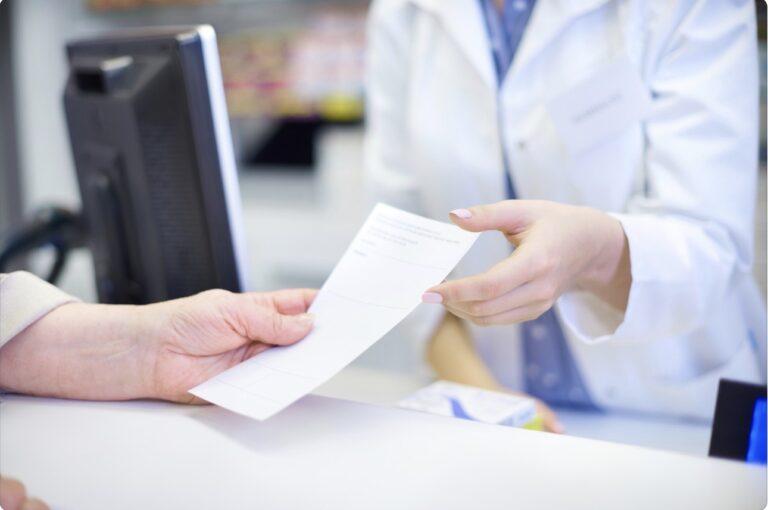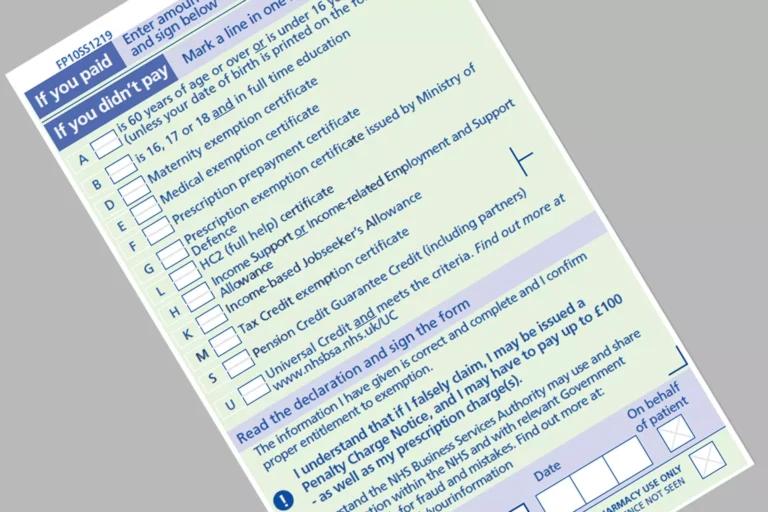Prescriptions on the NHS can be a significant cost for many individuals, but certain exemptions exist to help alleviate this financial burden. If you’re wondering whether you qualify for free NHS prescriptions or any other forms of assistance with NHS costs, this article will guide you through the process of determining your eligibility. By understanding the criteria and resources available to you, you can make informed decisions about your health costs.
What are NHS prescriptions?
NHS prescriptions refer to the medications and treatments prescribed by healthcare professionals that are available through the National Health Service in the UK. These prescriptions cover a wide range of medications, including essential drugs for chronic conditions, contraceptives and treatments for acute illnesses.
How much do NHS prescriptions cost?
The cost of NHS prescriptions can vary depending on the specific medication and the individual’s circumstances. In England, the current standard prescription charge is £9.65 per item (as of November 2023). However, certain individuals may be eligible for free prescriptions or reduced costs based on their exemption status.
Why do exemptions exist?
Exemptions for NHS prescriptions exist to ensure that individuals who may face financial difficulties are not discouraged from accessing necessary medications. These exemptions provide support for those who are unable to afford prescription charges due to their age, income, medical conditions, or other circumstances.
Eligibility criteria for NHS prescription exemptions
Determining your eligibility for free NHS prescriptions or other forms of assistance with NHS costs involves considering various factors. The following are the key criteria that may make you exempt from prescription charges:
Age-based exemptions
Some age groups are automatically exempt from paying prescription charges. For instance, individuals under the age of 16 or over the age of 60 are entitled to free NHS prescriptions.
Income-based exemptions
If you have a low income, you may qualify for free NHS prescriptions or reduced charges. The exact income thresholds for eligibility depend on your location within the UK.
Location-based exemptions
Certain areas within the UK offer additional exemptions or reduced prescription charges based on the individual’s residential address. These exemptions are often applicable to individuals residing in Scotland, Wales, or Northern Ireland.
Benefit-based exemptions
If you receive specific benefits, such as Income Support, Jobseeker’s Allowance, or Universal Credit, you may be exempt from paying prescription charges. These benefits are typically means-tested, and eligibility criteria vary.
Pregnancy-related exemptions
Pregnant women and individuals who have given birth within the past 12 months are entitled to free NHS prescriptions. This exemption is applicable regardless of age or income.
Medical condition exemptions
Individuals with certain medical conditions may be exempt from prescription charges. Conditions such as cancer, epilepsy, diabetes, and hypothyroidism are among those that may qualify for exemptions.
Checking your eligibility for free NHS prescriptions
Determining whether you qualify for free NHS prescriptions or other forms of assistance with NHS costs is a crucial step in managing your healthcare expenses. The following methods can help you ascertain your eligibility:
Online exemption checker
The NHS provides an online exemption checker tool that allows you to input your details and ascertain your eligibility for free prescriptions. This tool takes into account factors such as age, income, and medical conditions to determine your exemption status.
Valid exemption certificates
If you have a valid exemption certificate, you are entitled to free NHS prescriptions. These certificates include a valid medical exemption certificate, a valid maternity exemption certificate, a valid war pension exemption certificate, an NHS Tax Credit Exemption certificate and Prescription Prepayment Certificates (PPCs), which will be discussed in more detail later.
Duration and entitlements of exemptions
It’s important to note that exemption certificates have expiration dates. It is your responsibility to keep track of the validity of your exemption and renew it if necessary. Additionally, your exemption may entitle you to other benefits, such as free NHS dental treatment or help with travel costs related to healthcare.
Additional help with NHS costs
In addition to free NHS prescriptions, there are other forms of assistance available to help with various NHS costs. These include:
Dental treatment
NHS dental treatment can also be costly, but certain exemptions and assistance schemes exist to make it more affordable. Depending on your circumstances, you may be eligible for free dental treatment or reduced charges.
Eye tests
Regular eye tests are essential for maintaining good eye health. If you’re eligible for free NHS prescriptions, you may also qualify for free NHS eye tests. This can help you monitor your vision and detect any potential eye conditions early on.
Other NHS costs
Apart from prescriptions, dental treatment, and eye tests, there may be other NHS costs that you need assistance with. These can include travel expenses related to receiving healthcare, costs for wigs and fabric supports, and more. Eligibility for assistance with these costs varies depending on your circumstances.
Applying for assistance with NHS Costs
If you meet the eligibility criteria for free NHS prescriptions or other forms of assistance, it’s important to understand the application process. The following are the key methods and certificates available:
Prescription Prepayment Certificates (PPCs)
A Prescription Prepayment Certificate (PPC) allows you to make a one-time payment for a specified period, entitling you to an unlimited number of prescriptions within that timeframe. This option is particularly beneficial for individuals who require frequent medications.
Exemption certificates
Exemption certificates are issued for specific circumstances, such as medical conditions, pregnancy, or low income. These certificates serve as proof of exemption and must be presented when collecting prescriptions or receiving dental treatment.
HC2 and HC3 certificates
HC3 and HC2 certificates also known as NHS Low Income Scheme certificates, provide additional assistance with NHS costs for individuals with limited financial resources. These certificates are means-tested, and eligibility is determined by your income and personal circumstances.
The importance of accurate exemption claims
When claiming exemption from NHS prescription charges, it is crucial to ensure the accuracy of your claim. Making incorrect claims can result in penalties and charges. To avoid any issues, follow these guidelines:
Penalties for incorrect claims
Incorrectly claiming exemption from prescription charges can lead to penalty charges, which can be significant. It is essential to provide accurate information and update your exemption status if it changes to avoid any penalties.
Regularly checking exemption validity
Exemption certificates have expiration dates, and it is your responsibility to ensure their validity. Regularly checking the expiry date of your exemption certificate and renewing it on time will help you avoid unexpected charges.
Resources for help and information
If you require additional information or assistance with NHS costs, the following resources can be helpful:
NHSBSA Online Exemption Checker
The NHS Business Services Authority (NHSBSA) provides an online exemption checker that allows you to verify your exemption status. By entering your personal details and exemption certificate details, you can quickly determine if your certificate is still valid and whether you’re entitled to free prescriptions.
If you prefer to speak to someone directly, you can contact the NHS BSA helpline for assistance. They can provide information on your exemption status and answer any queries you have regarding prescription charges and exemptions.
NHS websites and services
The NHS provides comprehensive information on its websites regarding prescription exemptions, dental treatment, eye tests, and other forms of assistance with NHS costs. These websites can provide detailed guidance and answer frequently asked questions. Check what help you could get to pay for NHS costs on the NHS Business Services Authority website
Contacting NHS authorities
If you have specific questions or need personalised advice regarding your eligibility for free NHS prescriptions or other forms of assistance, you can contact NHS authorities directly. They can provide guidance based on your circumstances.
Conclusion
Determining your eligibility for free NHS prescriptions and other forms of assistance with NHS costs can help alleviate the financial burden associated with healthcare. By understanding the criteria and resources available to you, you can make informed decisions about managing your healthcare expenses. Remember to regularly check the validity of your exemption status and seek assistance from NHS authorities if needed. Accessing the support you’re entitled to will ensure that you can prioritize your health without worrying about prohibitive costs.
Sources
- Check if you can get free prescriptions – NHS
- Check if you have an NHS exemption | NHSBSA
- Get help with NHS prescriptions and health costs – GOV.UK
Medical Disclaimer
NowPatient has taken all reasonable steps to ensure that all material is factually accurate, complete, and current. However, the knowledge and experience of a qualified healthcare professional should always be sought after instead of using the information on this page. Before taking any drug, you should always speak to your doctor or another qualified healthcare provider.
The information provided here about medications is subject to change and is not meant to include all uses, precautions, warnings, directions, drug interactions, allergic reactions, or negative effects. The absence of warnings or other information for a particular medication does not imply that the medication or medication combination is appropriate for all patients or for all possible purposes.
Related Articles
Are prescriptions free for pregnant women?
If you’re pregnant or have given birth within the last 12 months, you can apply for a maternity exemption certificate. This certificate ensures that you receive free NHS prescriptions during this period. You can obtain an application form (FW8) from your doctor, midwife, or health visitor.
How do I apply for a Prescription Prepayment Certificate (PPC)?
If you don’t qualify for free prescriptions but require regular medication, a Prescription Prepayment Certificate (PPC) may be a cost-effective option. A PPC allows you to pay a fixed fee for a specified period, covering all your NHS prescriptions during that time. You can purchase a PPC online, by phone, or by completing an application form (FP95), available from most pharmacies or the NHS BSA website.








